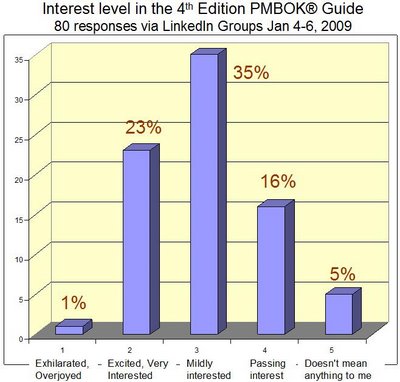
Taking advantage of the social networks that we PMs have started to form on LinkedIn, I did some polling in early 2009 to gauge the interest level (see post below) in the brand-spanking-new PMBOK(R) Guide.
Using a completely non-scientific scale that I made up in 17.4 seconds, and asking the question on the larger LinkedIn Groups (including my own – LinkedIn Bloggers), I got about 80 responses over the past few days.
I was particularly impressed with the time people took to write very intelligent commentary. I think I touched a nerve with regards to the PMBOK Guide. People wrote to compare it with PRINCE2 and ITIL. People wrote to praise it, to tear it down, to exalt the PMI and to lambaste the PMI. But they did it all with a sharp wit and a deep insight that provided me with a mini “pulse” of the PM population with respect to the PMBOK Guide specifically, PMI standards more generally, and the PM discipline overall.
If you were one of the respondents, thank you. If you were one of the many who not only gave me your evaluation along my scale, but also wrote a paragraph or two, or a whole chapter, my hat is really off to you. Thanks. Really, thanks.
Now, to the results.

Remember that this was not – repaeat not – an anonymous survey. So people who were giving scores of a 5 (effectively yawning out loud at the PMBOK Guide update) were willing to make that statement in public with their name on it.
Only one person of the eighty respondents said that they were exhilirated and overjoyed at the arrival of the new PMBOK Guide. That’s an outcome, I think, of my silly scale. Still, I thought we may have seen a few more of these folks pipe up.
On the other end, we did have 5% brave souls say that this “doesn’t mean anything” to them.
In the middle, we had over 50% say that they were mildly interested or had a passing interest in the new PMBOK Guide. And about a quarter were excited or very interested.
Regarding the comments, one recurring theme was that those who gave the lower scores (i.e. showed more interest) were those who had some connection to the training, caring, feeding, etc., of Project Managers. Here I count those who create PM courseware, PMP-prep materials, or oversee the ‘soft skills’ piece of their PMOs.
To me there are a few lessons learned here:
1. There is a great value in these PM social networks in terms of getting a pulse of the community. At the end of the posting I will put some links to these groups in LinkedIn. I suggest you check them out and join. Take advantage of the power of the (your) network.
2. There is a good deal of pent-up frustration out there with the PMI, although there seemed to be a common feeling that this new edition was a step in the right direction.
3. At least a subset of the community of people who work on PM education/training/certification are paying attention. They realize that – like it or not – the new PMBOK Guide has to be reckoned with.
Here are some links to the LinkedIn groups I mentioned above:
PM Bloggers
For those (crazies) who blog about PM
http://www.linkedin.com/groups?gid=72053
Over 600
Global Project Management
Over 7000 Members
PM Link
Over 16,000 Members
PMI Certified PMPs
Over 7000 Members
Project and Program Management Professionals
1,057 Members
Project Management Networking Group (PMNG)
25,619 Members
Project Managers Group
6,232 Members
sDB+PM Group
412 Members
After looking at these, by the way, I had the same thought that I did when I saw my alma mater’s alumni networking groups fractured into 5 or 6 disparate pieces. That thought: why can’t these be combined in some way? There may be some distinctions (like my group, PM Bloggers, which focuses on a particular aspect) that make sense, but having all of these groups is fragmenting the possibilities of a really large vibrant community. Any comments on that?
What are your thoughts about the new PMBOK(R) Guide? What successes or flops have you had using LinkedIn groups?

Everybody keeps talking about how to become a great Project Manager, what about team members? All the PMBOK/theory stuff is good, but I fear most project managers are discovering that there needs to be some kind of training for team members too. A girl can wish, can’t she?
Thanks for the comments, Mike.
For me, the new PMBOK was a big yawn. They spruced up the layout and graphics, renamed all the processes into verb-object pairs, and completely missed on some areas that needed improvement. I’m a risk guy, focusing on it professionally, academically, and in PMP prep training. I provided four or five comments to PMI about how to improve the section, but all I got was a “thanks, but we’re tabling your suggestion for now.” The risk chapter has no new content, despite all the advances in PRM (which I happen to think is one of the weakest sections of the PMBOK). The cost chapter is mostly unchanged, too, from my initial review, except that they finally clarified the role parametric estimating has been estimating and budgeting. Bottom line: I bought all three new standards (project, program, portfolio) so I’d have them, but I have yet to find anything in the new PMBOK that made it worth the money.